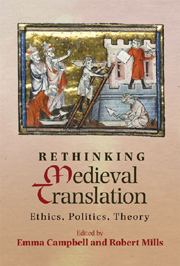Book contents
- Frontmatter
- Contents
- List of Illustrations
- List of Contributors
- Acknowledgements
- Introduction: Rethinking Medieval Translation
- 1 On Not Knowing Greek: Leonzio Pilatus's Rendition of the Iliad and the Translatio of Mediterranean Identities
- 2 Translation and Transformation in the Ovide moralisé
- 3 Translating Lucretia: Word, Image and ‘Ethical Non-Indifference’ in Simon de Hesdin's Translation of Valerius Maximus's Facta et dicta memorabilia
- 4 Translating Catharsis: Aristotle and Averroës, the Scholastics and the Basochiens
- 5 The Ethics of Translatio in Rutebeuf's Miracle de Théophile
- 6 Invisible Translation, Language Difference and the Scandal of Becket's Mother
- 7 Medieval Fixers: Politics of Interpreting in Western Historiography
- 8 The Task of the Dérimeur: Benjamin and Translation into Prose in Fifteenth-Century French Literature
- 9 The Translator as Interpretant: Passing in/on the Work of Ramon Llull
- 10 Rough Translation: Charles d'Orléans, Lydgate and Hoccleve
- 11 Bueve d'Hantone/Bovo d'Antona: Exile, Translation and the History of the Chanson de geste
- Untranslatable: A Response
- Bibliography
- Index
5 - The Ethics of Translatio in Rutebeuf's Miracle de Théophile
Published online by Cambridge University Press: 05 April 2013
- Frontmatter
- Contents
- List of Illustrations
- List of Contributors
- Acknowledgements
- Introduction: Rethinking Medieval Translation
- 1 On Not Knowing Greek: Leonzio Pilatus's Rendition of the Iliad and the Translatio of Mediterranean Identities
- 2 Translation and Transformation in the Ovide moralisé
- 3 Translating Lucretia: Word, Image and ‘Ethical Non-Indifference’ in Simon de Hesdin's Translation of Valerius Maximus's Facta et dicta memorabilia
- 4 Translating Catharsis: Aristotle and Averroës, the Scholastics and the Basochiens
- 5 The Ethics of Translatio in Rutebeuf's Miracle de Théophile
- 6 Invisible Translation, Language Difference and the Scandal of Becket's Mother
- 7 Medieval Fixers: Politics of Interpreting in Western Historiography
- 8 The Task of the Dérimeur: Benjamin and Translation into Prose in Fifteenth-Century French Literature
- 9 The Translator as Interpretant: Passing in/on the Work of Ramon Llull
- 10 Rough Translation: Charles d'Orléans, Lydgate and Hoccleve
- 11 Bueve d'Hantone/Bovo d'Antona: Exile, Translation and the History of the Chanson de geste
- Untranslatable: A Response
- Bibliography
- Index
Summary
Rutebeuf's Miracle de Théophile is a work connected to translation on a number of different levels. As the essays in this collection attest, translatio (and its vernacular cognates) had a broad range of meanings in the Middle Ages that could be used to refer to textual or linguistic translation but that also denoted non-textual forms of movement, relocation and transfiguration. Rutebeuf's play, in addition to translating and adapting other versions of the Theophilus legend, participates in this expanded notion of translatio; along with other religious or moralizing works examined in this volume, this text also demonstrates the close relationship between such notions of translation and the sacred. Commissioned by the bishop of Paris and thought to have been performed in 1263 (or 1264) as part of the festivities for the Nativity of the Virgin, Rutebeuf's play, like other religious works, aims to translate between the human and the divine for the benefit of the author's and the community's souls. Translatio in Rutebeuf's text – insofar as it is related to the mediation between human subjects inclined towards sin and the divine forces that might save them – is thus inevitably related to Christian ethics.
- Type
- Chapter
- Information
- Rethinking Medieval TranslationEthics, Politics, Theory, pp. 107 - 124Publisher: Boydell & BrewerPrint publication year: 2012



